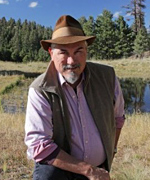—Alan Dulaney
 Recently the Arizona Town Hall spent 3 days talking about water. The theme was “Keeping Arizona’s water glass full.” The makeup of the Town Hall wasn’t just a bunch of water buffaloes; included were farmers, students, ranchers, lobbyists, educators, lawyers, retirees, and many others, all invited to talk (for the sixth time in 50 years) about Arizona’s water resource issues. I don’t know how many hydrologists were invited.
Recently the Arizona Town Hall spent 3 days talking about water. The theme was “Keeping Arizona’s water glass full.” The makeup of the Town Hall wasn’t just a bunch of water buffaloes; included were farmers, students, ranchers, lobbyists, educators, lawyers, retirees, and many others, all invited to talk (for the sixth time in 50 years) about Arizona’s water resource issues. I don’t know how many hydrologists were invited.
The group came up with five recommendations at the end. Support for ADWR’s Strategic Vision for Water Supply Sustainability was perhaps the most important. This document, which divides the state into 22 planning areas, will address the needs of each individually. It creates a series of augmentation and conservation measures with local stakeholders and will identify the legal changes needed to implement such measures.
The second recommendation was to support ADWR financially. No mention was made of money for ADEQ. Financing the Arizona Water Supply Development Revolving Fund was the third recommendation. Educating the public and politicians on water issues was the fourth, although we have been relatively successful at that for years. Lumped under the fifth recommendation dealing with augmentation and conservation were several ideas, including desalinization, direct potable reuse of reclaimed water, and protection of the forest watersheds (the Four Forest Restoration Initiative). The final recommendation was to tweak the legal framework for water rights in Arizona and get the adjudications process moving again.
Noticeably absent was any suggestion of some grand scheme to come up with vast new supplies of water. No new CAP canals will ever be built to divert rivers of the Midwest; no icebergs will dock at ports along the Colorado River; no magic will appear to banish aridity forever. The reality is that the major features of Arizona water supply picture are largely in place. What remains is the fine-tuning of the management of our portfolio to ensure that all sectors get something and water is not stolen from anyone (agriculture was adamant that they could not be expected to yield up more). That is our future. Hydrologists will be needed to address the practical challenges of incrementally increasing water supply and conserving it through infrastructure. Let’s hope we perform this task well.